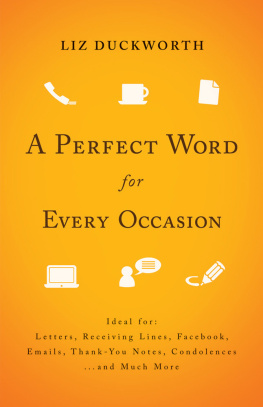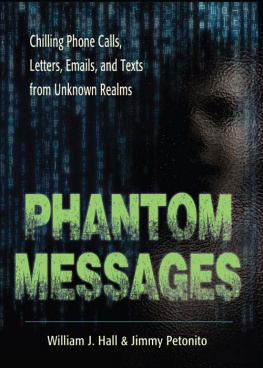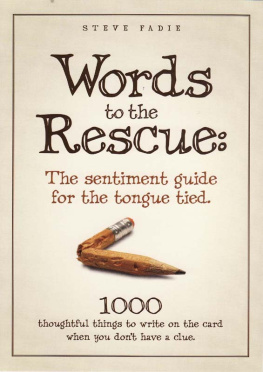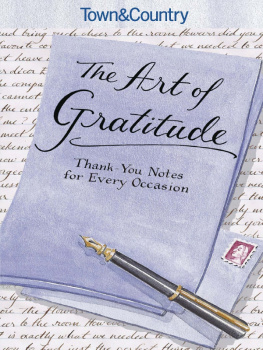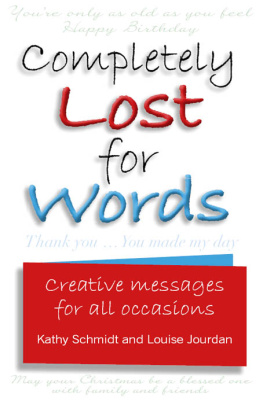Contents
Introduction
1. Words for the Grieving
For the Loss of a Spouse
For the Loss of a Child
For the Loss of a Parent, a Close Family Member, or Shared Family Member
For the Loss of a Parent When Death Was Not Unexpected
For the Loss of a Friend
For the Loss of a Colleague
For the Loss of a Pet
2. Words of Gratitude
For a Gift of Money
For a Material Gift
For Friendship
For a Gift of Thoughtfulness
For Kind Words
3. Words for the Sick and Suffering
When Someone Struggles With Short-Term Illness
When Someone Suffers From a Chronic Illness
When Someone Is Struggling With a Terminal Illness
When Someone Is Recovering From an Injury
When Someone Struggles With a Life-Altering Injury
4. Words for Birthdays
Birthday Wishes for Friends
Birthday Wishes for Colleagues
Birthday Wishes for Neighbors
Birthday Wishes for Family Members
Birthday Wishes for Children
5. Words for Weddings and Engagements
Announcing an Engagement When Its Fairly Simple
Wedding Invitations
Engagement Announcements and Wedding Invitations 202
Words for Wedding Announcements
Words for Reply Cards
Words for Responding to the Couple
Words to Bless the Couple
6. Words of Encouragement
A Job Loss
The End of a Relationship
General Disappointments and Struggles
Depression
Loss of a Dream
7. Words for Celebrations
Birth and Adoption
Graduation
Promotion
Retirement
8. Words for Events and Activities
Words of Invitation
Words of Acceptance
Words of Appreciation and Affirmation
Words About Answers to Prayer
9. Words of Truth and Love
Apology and Asking for Forgiveness
Granting Forgiveness
Words of Confrontation
Words for Difficult Times
10. Words for a Changing World
Finding the Right Words for Cyberspace
Words of Online Comfort
Notes
Introduction
T hat day at work was a hard one for Rob. It was his first day back in two weekstwo weeks missed because his daughter was born with a rare disorder and lived only a week. What was supposed to be a joyful time ended with crushed dreams and a babys funeral.
Rob knew his co-workers at the Christian publishing company had been praying for him and his family. Of course they cared. And thats why he was mystified that by the end of his first day back, not one person said anything to him about his loss. Not a mention. Not a word.
It left him feeling lonely and lost.
Most of us have found ourselves on the other side of this story. We know someone has been through pain and loss, but we find ourselves in a frozen place. A place where we want to offer help, but were too afraid of saying the wrong thing to say anything at all. We are at a loss for words. We buy a sympathy card, which doesnt seem to express what we really feel, and sign it. Without the right words, we end up sad but feeling helpless.
Our loss for words isnt always such a heavy matter. Its not that we dont care, but were in a huge hurry. Our plates are full. Life is flying by at top speed and we are barely able to think, let alone send meaningful messages. Lifes major occasions come at us from every direction, and our ability to mark them well slips through our fingers.
Or were lost for words because we wonder whats left to say thats new under the sun. Where I work, we pass around birthday cards for everybody to sign. When its time to jot my special thoughts into a two-inch square of space, my brain blanks out. Thats better than Jeff, though. He was on autopilot one day when he scribbled Happy Birthday in bold letters with three exclamation pointsonto the sympathy card for Bill, who lost his father. Theres still a use for Wite-Out in this high-tech world of ours.
What happened? Why do we often find ourselves at a complete loss for words, or looking for the right words in all the wrong places?
When looking to place blame, Id like to thank the Internet. Our computers, iPads, and smartphones are portals to a million trillion billion words. So many words on the World Wide Web: gigs and bytes and an infinity of information. More words than people have ever before had at their fingertips. So thank you, Internet, for giving us so many words, yet often leaving us speechless.
Is it just me? Because I think somehow the act of pushing a button to instantly find anything has robbed us of the ability to access our own heart to find the right words at the right time.
Words of comfort and care.
Words of sympathy and understanding.
Words of truth and joy.
Words that say exactly what we feel.
Okay. Its not just technologys fault. Its our culture, our fast-paced lives, our lack of practice crafting what we write.
Sure, our words are dashed off in an email, tweeted on Twitter, or posted as the latest Facebook status. Words: Weve got a million of em, and they are flying through cyberspace at breakneck speed.
Its not that we dont have enough words. We have so many words, we dont know where to even begin when its time to:
- write the perfect message on a card we hope will be saved and savored by someone we love;
- find the right words to comfort another in the wake of grief and loss;
- join a friend, colleague, or relative at any point in lifes journeya birth, graduation, or retirementand share understanding.
I believe in the power of our God-given hearts and minds to tap in to the creativity and thought needed to reach out to people around us. And as believers, we have the Spirit to guide us toward grace-filled words. What we lack is practice.
Back in the olden days of yore, people had a lot more practice with notes, cards, and correspondence. Long-distance phone calls were expensive, so that left the mail to deliver insights into daily life. As a young married woman, I was excited to receive a plain postcard from my grandma every few weeks. Shed type on it front and back, leaving a tiny space for my address. She included tidbits about her world: The hail wiped out the corn. Grandpa put out a prairie fire just in time. Bridge club is coming over for cards. Her little notes were poetry of precision and love typed out single-spaced. You dont see that much anymore.
At Compassion International, where I work, a big part of our child sponsorship ministry enables sponsors to write encouraging letters to children in poverty. Many struggle with letter writing because its a foreign activity these days. These good people want to reach out to sponsored kids but dont know what to say or how to say it. Of course, its often a new experience for our sponsored kids too. Daniel, my fourteen-year-old sponsored teen from Ecuador, recently wrote and asked if there were condors in Chicago. (Maybe I confused him by sending photos from a Chicago business trip. Sadly, I never saw a condor there.) Its so hard to cross the bridge between lives, cultures, and backgrounds with only a few precious words.
Still, we can get back what weve lost to the intensity of our Internet age. And in discovering how to find our best words, we can learn to know ourselves and grow closer to people in our lives. Its a lesson in empathy. A curriculum of caring.
To help you, this book is filled with ideas, shortcuts, exercises, and examples.
Its not a substitute for searching for words. It just offers signposts along the way in your own journey.
Okay, sometimes it will get you where youre going a little faster. Help you write that card or make that memorable statement. But I hope it will give you much more than a template for your thoughts.

